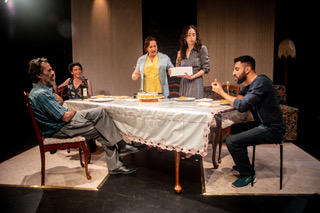This is exciting premiere Australian work, and Belvoir’s 25A and Brave New Word should be congratulated.
Though new work, I’ve had the privilege of reading the script in an earlier incarnation; in 2019, when it was shortlisted for the Silver Gull Play Award.
This is not the same play, though it’s a close kissing cousin. James Elazzi’s engaging story of a young gay man living in a community reluctant to accept homosexuality has morphed since I first read it. It has opened up, and is now an ambiguous, provocative piece of theatre.

And though I’ve been fortunate enough to see brief glimpses of this stimulating work in its development, I’m still very distant from it.
An initial response might be to bristle at potential anachronisms. Is the Lebanese Australian Christian community still in denial? Do young members of this community still engage in duplicitous behaviour in order to protect themselves? I have absolutely no idea.
Which posits the interesting question: Is the role of the playwright to document society? And, if so, what technical and moral attributes would be required of them to do this effectively? And what sort of awareness, both in terms of aesthetics and epistemology, would the audience of such a work need? Watching a play like this, do I say “Well, that’s the Lebanese Australian Christian community” or do I postpone judgement, counting this play as merely the equivalent of a single anecdote from someone I assume is an insider?
In the play, the young protagonist, Adam, has sexual encounters with strangers in public toilets. This is a powerful image of marginalisation and the reckless desperation it engenders. Curiously, these are the only moments in the production not presented in a naturalist mode: the actor stands alone on stage simulating a sexual act, while all sound is pre-recorded and the other male participant is physically absent. Is it the anomalous nature of this act in Adam’s otherwise conventional life that is being suggested? Probably – because it’s not especially suggestive of sex. Are contemporary audiences not ready for more vivid representations of this type of anonymous sex? See my earlier comments on anachronism.
Director Anna Jahjah has elicited wonderful performances from her cast, each presenting an individual wrenched in opposing directions, torn by the desire to reject their community’s unpalatable demands while simultaneously longing to hold that community together. Mansoor Noor’s Adam is a brilliantly complex portrayal of a young man morally disfigured by pain, a protagonist who evokes equal parts sympathy and antipathy. Adam’s treatment of the two young women in his life is disturbing to watch. His cousin Claire also attempts to navigate the communal myopia, and Kate Bookallil plays her with both a thrilling waspishness and intense vulnerability. Angela, Adam’s ex-girlfriend, seeks sense and security in all the duplicity and deliberate obtuseness, with Violette Ayad’s fascinating portrayal endowing her with both dignity and fragility. Deborah Galanos plays Adam’s mother, Carol, with a performance balanced delicately between vivacity and anger. Simon Elrahi’s John is frustrated paternal expectation engaged in a gripping battle with loving acceptance.
Social documentation? The eternal challenge of individuality within community? Go and choose.
Paul Gilchrist
Son of Byblos by James Elazzi
Downstairs Belvoir until 21st May
photo credit @davidhooley
Leave a comment